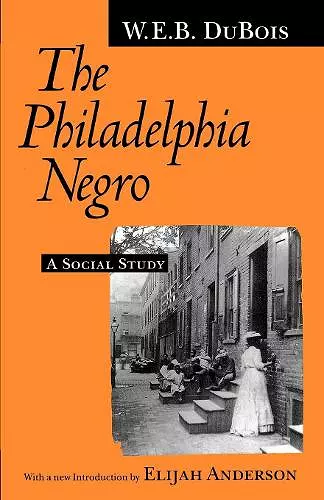The Philadelphia Negro
A Social Study
W E B Du Bois author Elijah Anderson editor
Format:Paperback
Publisher:University of Pennsylvania Press
Published:29th Dec '95
Should be back in stock very soon

The first example of engaged sociological scholarship, and one of a major American thinker’s earliest works, with a newly updated introduction by Elijah Anderson
The Philadelphia Negro is the first, and perhaps still the finest, example of engaged sociological scholarship-the kind of work that, in contemplating social reality, helps to change it.
In 1897 the promising young sociologist William Edward Burghardt Du Bois (1868–1963) was given a temporary post as Assistant in Sociology at the University of Pennsylvania in order to conduct a systematic investigation of social conditions in the seventh ward of Philadelphia. The product of those studies was the first great empirical book on the Negro in American society.
More than one hundred years after its original publication by the University of Pennsylvania Press, The Philadelphia Negro remains a classic work. It is the first, and perhaps still the finest, example of engaged sociological scholarship—the kind of work that, in contemplating social reality, helps to change it.
In his introduction, Elijah Anderson examines how the neighborhood studied by Du Bois has changed over the years and compares the status of blacks today with their status when the book was initially published.
"A century ago, Du Bois published The Philadelphia Negro, a work now recognized as a sociological classic. He developed a highly detailed portrait of black social life in Philadelphia. Part of the legacy of his analysis has lost the theoretical holism which linked structural issues of the economy and labor market dynamics to more social psychological and microsocial issues of prejudice and interpersonal discrimination. Sociology would do well to revisit the model Du Bois established." * Lawrence D. Bobo, The Annals of the American Academy of Political and Social Science (March 2000) *
"What made Du Bois's study remarkable in its day was its rejection of prevailing assumptions of inherent racial differences, thus bearing on issues much wider than those indicated by its title. It is also notable as a thoroughly modern piece of social research. The problems faced by Philadelphia's blacks, he argued, had nothing to do with their supposed racial proclivities, but derived from the way they had been treated in the past and their relegation in the present to the most menial and lowest-paying jobs." * Times Literary Supplement *
ISBN: 9780812215731
Dimensions: unknown
Weight: unknown
568 pages